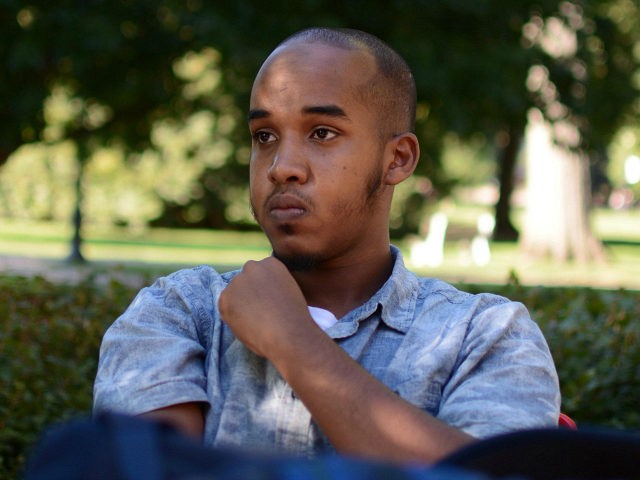Somali college student Abdul Razak Ali Artan resided in Pakistan — known as a breeding ground for Islamic terrorist groups — for seven years before he was admitted into the U.S. and used a vehicle and a butcher knife to attack people at the Ohio State University (OSU) campus on Monday morning, wounding 11 people.
Pakistan may have played a role in radicalizing Artan, who was ultimately killed by law enforcement after Monday’s attack at Ohio State.
CNN reports:
Artan, who was originally from Somalia, left his native country with his family in 2007. They headed to Pakistan, where they were admitted as refugees as part of a minority sect of Somalis, a senior administration official told CNN. Seven members of the family applied for refugee status in the United States and were admitted in 2014. Today, they are all legal permanent residents and green card holders.
The Islamic State (ISIS/ISIL) has claimed responsibility for the attack.
In recent months, ISIS propaganda has urged jihadists to carry out lone-wolf attacks in their home countries with whatever weapons they have at their disposal, including vehicles and knives.
The Afghanistan-Pakistan region is home to “the highest concentration” of different Islamic terrorist organizations of “any area in the world,” declared Gen. John Nicholson, the top commander of U.S. and NATO forces in Afghanistan, earlier this year.
“Of the 98 U.S. or UN-designated terrorists organizations around the globe, 20 of them are in the Af-Pak region,” he revealed in September.
Some Republican lawmakers have proposed designating Pakistan a state-sponsor of terrorism.
On September 20, Republican Reps. Ted Poe from Texas, chairman of the House Foreign Affairs Subcommittee on Terrorism, and Dana Rohrabacher from California, chairman of the House Foreign Affairs Subcommittee on Emerging Threats, introduced the Pakistan State Sponsor of Terrorism Designation Act.
As mandated by the National Defense Authorization Act (NDAA) for fiscal year 2016, the U.S. has already stopped more than $300 million in military reimbursements to Pakistan for refusing to take adequate action against the Haqqani Network, a terrorist group linked to al-Qaeda and its ally the Taliban.
ISIS established its presence in the Afghanistan-Pakistan region in January 2015, after Artan migrated to the United States.
Besides his links to Pakistan, which the Pentagon has repeatedly accused of serving as a terrorist sanctuary, a Facebook rant Artan reportedly posted just minutes before the attack strongly suggested a jihadist influence behind his actions.
In the “declaration,” Artan praises the radical American-born al-Qaeda cleric Anwar al-Awlaki as a “hero.”
ISIS considers al-Qaeda to be its rival. However, many ISIS members and other Sunni jihadists have been known to be fans of Awlaki. Although the U.S. government executed Awlaki, his propaganda has inspired various domestic attacks in the United States in the years after his death.
“I am sick and tired of seeing [Muslims] killed & tortured everywhere,” reads Artan’s rant, according to media reports.
“If you want us Muslims to stop carrying lone wolf attacks, then make peace,” the Facebook post adds. “We will not let you sleep unless you give peace to the Muslims.”
Artan’s case shares some similarities with that of “Chelsea bomber” Ahmad Khan Rahami. Rahami, a naturalized U.S. citizen of Afghan descent, also spent time in Pakistan, where he received “Islamic education” at a Taliban-linked seminary prior to planting the bombs in New York and New Jersey that injured 31 people in September.
Rahami and his family entered the United States as asylum seekers in 1995, reported NBC New York.
Citing an anonymous law enforcement official familiar with the investigation into the bombings, NBC News New York reported that a note left on one of the bombs referenced Awlaki.
Daily Mail reports that “between 2013 and 2015 alone, the United States has accepted more than 25,000 Somalian refugees,” adding that “It appears Artan entered the country in 2014 as one of 9,000 Somalian refugees – the highest Somalian influx in the past three years.”
Somalia is also home to terrorist groups.
The al-Qaeda affiliate al-Shabaab is the most prominent group in and around Somalia.

COMMENTS
Please let us know if you're having issues with commenting.